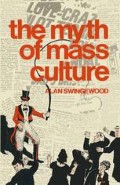Abstract
As we have argued in previous chapters, underpinning the Marxist theories of the Frankfurt School (Marcuse, Horkheimer and Adorno) is a model of modern capitalist society as a mass society. Although there are differences of emphasis between these theorists, they all agree that, with the development of the capitalist mode of production, the civil institutions grow progressively weaker as the role of the state becomes more and more dominant in economic management and social and cultural organisation. In these circumstances the question of social integration devolves on the state and the notion of legitimacy itself becomes increasingly problematical. Marx’s revolutionary class is now integrated fiom above by the ‘culture industry’ — the mass media of television, radio, newspapers and magazines. The dominant ideology is thus imposed on a passive, pliant mass: ‘the result of a permanent and pervasive effort, conducted through a multitude of agencies, and deliberately intended … to dissuade members of the subordinate classes, if not from holding, at least from voicing unorthodox views’. This argument of Ralph Miliband crudely echoes the pessimistic theories of the Frankfurt School and the two chapters of his book, The State in Capitalist Society, devoted to the problem of legitimacy constitute a sustained attempt to show that social integration is the direct result of ‘a process of massive indoctrination’.1
Preview
Unable to display preview. Download preview PDF.
Notes
Habermas, ‘The Public Sphere’, New German Critique. (First published in German in 1964.)
See discussion in A. Swingewood, Marx and Modern Social Theory (London, 1975) pp. 64–8.
N. Poulantzas, Classes in Contemporary Capitalism (London, 1975) p. 289; Political Power and Social Classes p. 206.
Althusser and E. Balibar, Reading Capital (London, 1970) p. 180.
For Weber’s concept of traditionalism, see H. H. Gerth and C. W. Mills (eds), From Max Weber: Essays in Sociology (New York, 1946 ) p. 296.
J. S. Mill, Principles of Political Economy (London, 1848 ) pp. 322–3.
J. O’Connor, The Fiscal Crisis of the State (New York, 1973) p. 6.
Author information
Authors and Affiliations
Copyright information
© 1977 Alan Swingewood
About this chapter
Cite this chapter
Swingewood, A. (1977). Ideology and Mass Communications — the Problem of Legitimacy. In: The Myth of Mass Culture. Palgrave, London. https://doi.org/10.1007/978-1-349-15783-9_4
Download citation
DOI: https://doi.org/10.1007/978-1-349-15783-9_4
Publisher Name: Palgrave, London
Print ISBN: 978-0-333-21408-4
Online ISBN: 978-1-349-15783-9
eBook Packages: Palgrave Social & Cultural Studies CollectionSocial Sciences (R0)

